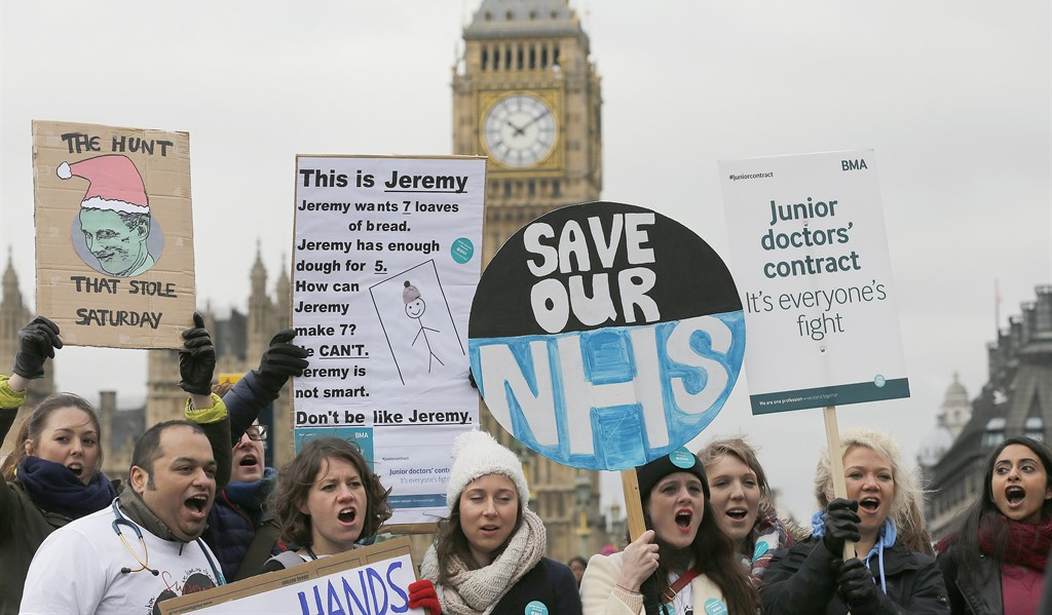Consultants at the British Medical Association are threatening to go on strike, citing pay cuts.
They'd be joining a months-long series of walkouts by British medical staffers. Nurses with the country's government-run National Health Service took to the picket lines in mid-December, January, and February. And while the British government plans to discuss pay-raises, a strike by junior doctors began this week. Meanwhile, record wait times are preventing British patients from accessing the care they need.
This ongoing debacle in Great Britain offers yet more evidence that the United States should reject Sen. Bernie Sanders's longtime call for Medicare for All. The Vermont senator and his progressive brethren continue to press for more government funding for and involvement in the U.S. healthcare system.
The failures of the National Health Service show the folly of that approach -- and indicate that a dose of U.S.-style private care is what British patients need.
Around 11% of Britons use supplemental private insurance to pay for healthcare services. Many millions more could. More access to private care allows for greater choice, and greater choice in health care leads to better health outcomes for patients. Already, certain private hospital groups are looking to build new facilities in the United Kingdom.
A government scheme to encourage or incentivize the public to purchase private care will cost far less than fixing the NHS and will give the British the healthcare outcomes they deserve.
All of the disarray at the NHS is leading to avoidable deaths and eroding satisfaction. One analysis puts excess mortality in England and Wales in 2022 at 1,700 deaths per week compared to the period from 2016-2019. People have noticed they won't get the care they need when they need it. Satisfaction with the overall NHS sits below 40%, down from 70% around a decade ago.
Recommended
Despite decreased satisfaction with the NHS, the British view it as a sacrosanct right. The NHS itself reports that 94% of Britons agree health care should be free, and 62% say the NHS makes them most proud to be British. For decades, Tory and Labour leaders alike have vowed to keep the NHS system founded in 1948 up and running.
But public health care is no good if it's conditioned on long wait times and worker strikes.
Start with the wait times. Over 7 million people in England are currently waiting for treatment, according to NHS data. Of those, thousands have been waiting more than a year, and several million more than 18 weeks. Some have even waited over 1,000 days for routine surgery.
Even if they don't need emergency or surgical services, people still wait weeks to see a GP. More than 5.3 million waited more than two weeks in November of last year. The wait times are records, partly attributable to the pandemic but mostly to staff shortages.
Long waits lead to severe consequences. In some cases, ambulances have been parking bumper-to-bumper, unable to discharge patients to hospital beds. Hospitals have so many patients that some have no other recourse but to sleep on floors. A father of five died from cardiac arrest after an ambulance failed to show up at his house 45 minutes after a 999 call.
Or consider the strikers, from the tens of thousands of nurses who hit the pickets in December to the junior doctors who walked out this Monday. Ambulance workers went on strike in January. The strikes have exacerbated the staffing shortages causing long wait times. Britain needs almost 11,000 more medical workers and 46,000 more nurses.
The Tory government has tried to fix things by allocating £500 million to the NHS last fall to reduce wait times and proposing "minimum service levels" for many public-sector workers, implying some NHS employees would have to work during a strike.
Now the government is promising pay negotiations and a "fair and reasonable settlement," conditioned on the strikes ending.
But none of those half-measures will solve the longer-term problems of the NHS. Only the market discipline -- and the demand relief -- that increased usage of, and competition with, private care can.
More private options would improve treatment for those who can afford it -- and those who can't -- by relieving the burden on the NHS. In short, it would behoove Sunak's government to fix the NHS by directing most people away from it.
Sally C. Pipes is president, CEO, and the Thomas W. Smith fellow in healthcare policy at the Pacific Research Institute. Her latest book is "False Premise, False Promise: The Disastrous Reality of Medicare for All," (Encounter Books 2020). Follow her on Twitter @sallypipes.

























Join the conversation as a VIP Member